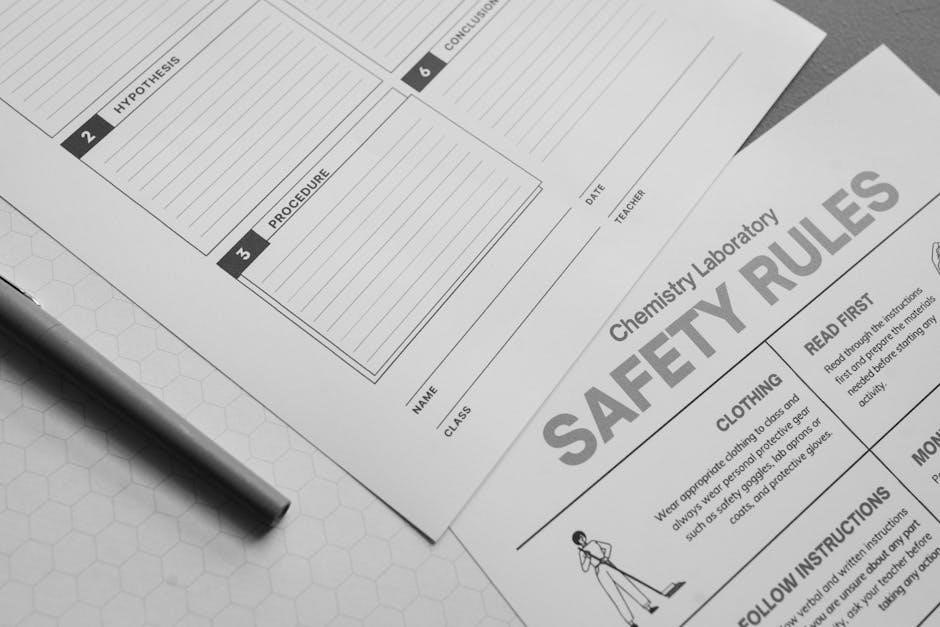
new jersey probate procedures manual
Navigate New Jersey probate with ease using our comprehensive manual. Your step-by-step guide to understanding the process.
New Jersey probate procedures involve legal processes for validating wills, managing estates, and distributing assets. It ensures the deceased’s wishes are respected and debts are settled fairly.
Overview of the Probate Process in New Jersey
New Jersey’s probate process begins with filing the will and death certificate with the court. The court authenticates the will, and letters testamentary are issued to the executor. The executor manages estate assets, notifies beneficiaries and creditors, and settles debts. Beneficiaries must be informed of their rights, and creditors have a timeframe to file claims. The process ensures fair distribution of assets according to the will, with the court overseeing disputes. Proper documentation and adherence to legal requirements are essential for a smooth probate process.
Importance of Understanding Probate Procedures
Understanding New Jersey probate procedures is crucial for executors and beneficiaries to navigate the legal process efficiently. It ensures compliance with state laws, avoiding delays or disputes. Proper knowledge helps executors fulfill their fiduciary duty, manage assets responsibly, and distribute them according to the will. Beneficiaries gain clarity on their rights and expectations. Without understanding, errors or oversights can lead to legal complications, financial penalties, or prolonged court involvement. Clear guidance is essential for all parties involved to ensure the estate is settled fairly and according to the deceased’s wishes.

Key Documents Required for Probate
Probate in New Jersey requires essential documents, including the original will, death certificate, and Letters Testamentary. These ensure the process is legally valid and properly executed.
The Role of the Death Certificate
The death certificate is a critical document in New Jersey probate, confirming the decedent’s passing. It must be filed with the court alongside the will and probate petition. Without it, the court cannot recognize the death as official, delaying the process. The death certificate also assists in managing estate assets and fulfilling the executor’s duties. Its accuracy ensures legal validity and proper handling of the estate, making it indispensable for initiating probate proceedings.
Understanding the Will and Its Components
A will outlines the deceased’s wishes for asset distribution, naming beneficiaries and an executor. It must include the testator’s intent, beneficiaries’ names, and the executor’s role. Signatures and witnesses are crucial for validity. The will guides probate, ensuring assets are distributed as intended. Understanding its components helps executors manage the estate effectively, respecting the deceased’s wishes while adhering to legal standards. This document is central to probate, directing the entire process and protecting the rights of all parties involved.
Importance of the Original Will
The original will is essential for probate, as it authenticates the deceased’s intentions and ensures legal validity. Without it, the court cannot confirm the testator’s wishes, potentially delaying the process. The original document prevents disputes among beneficiaries and creditors, as it serves as the primary evidence of the estate plan. Executors must locate and submit the original will to the court to initiate probate. Losing or damaging it can lead to legal challenges and complications, emphasizing the need for safekeeping and proper handling.

The Executor’s Role and Responsibilities
The executor handles probate, manages the estate, communicates with beneficiaries, and ensures tasks are completed in the best interests of the beneficiaries.
Choosing the Right Executor for the Estate
Selecting a trustworthy and capable executor is crucial for ensuring the estate is managed according to the deceased’s wishes. The executor should be organized, reliable, and able to handle legal and financial tasks. They must communicate effectively with beneficiaries and act in their best interests. Ideally, the executor should have experience in managing estates or legal matters. Choosing a neutral party can help avoid conflicts among beneficiaries. In New Jersey, the executor plays a key role in the probate process, making their selection vital for a smooth probate experience.
Fiduciary Duty of the Executor to Beneficiaries
The executor holds a fiduciary duty to act in the best interests of beneficiaries, ensuring fair and impartial management of the estate. This duty requires transparency, accountability, and avoiding conflicts of interest. Executors must communicate effectively with beneficiaries, providing updates on estate matters. They are responsible for managing assets responsibly and making decisions that align with the deceased’s wishes. Failure to uphold this duty can lead to legal consequences, emphasizing the importance of trustworthy and diligent execution. This obligation ensures beneficiaries’ rights are protected throughout the probate process.
Managing Estate Assets Responsibly
Managing estate assets responsibly involves safeguarding property, handling bank accounts, and ensuring proper administration. Executors must inventory assets, secure property, and manage financial accounts to prevent losses. They should maintain detailed records of all transactions to ensure transparency. Addressing property issues, such as selling or transferring real estate, is also critical. Responsible management ensures assets are preserved and distributed according to the will, fulfilling the deceased’s intentions and protecting beneficiaries’ interests throughout the probate process.

Probate Process Step-by-Step
The process begins with filing the will and petition, followed by court review and authentication, and issuing letters testamentary to the executor, initiating estate administration.
Filing the Will and Petition with the Court
Filing the will and petition with the court initiates probate. The executor submits the original will and a petition to the Surrogate Court, requesting probate. This step is crucial for legal validation and appointing the executor. Proper documentation ensures the process begins smoothly, adhering to New Jersey’s legal requirements. Accuracy in filing prevents delays and sets the groundwork for efficient estate administration.
Court Review and Authentication of the Will
The court reviews the will to ensure its validity, checking for the testator’s capacity and absence of fraud or undue influence. This process involves verifying signatures and potentially holding a formal hearing. Witnesses may testify to confirm the will’s authenticity. Once authenticated, the will becomes legally binding, guiding estate administration. This step is crucial for ensuring the document reflects the deceased’s true intentions and complies with New Jersey’s legal standards.
Issuing Letters Testamentary
After the will is authenticated, the court issues Letters Testamentary, granting the executor legal authority to manage the estate. This document enables the executor to access bank accounts, pay debts, and distribute assets according to the will. It serves as formal proof of the executor’s role and responsibilities. The court’s issuance of Letters Testamentary is a critical step, ensuring the executor can act on behalf of the estate and carry out the deceased’s wishes effectively.

Notifying Beneficiaries and Creditors
Notifying beneficiaries and creditors is a legal requirement to ensure transparency and fairness in the probate process, allowing all parties to be informed and involved.
Legal Requirements for Notification
New Jersey requires executors to notify beneficiaries and creditors formally. Written notices must be sent within specific timeframes, ensuring all parties are informed about the estate proceedings. The probate court oversees this process to guarantee compliance. Executors must act transparently, fulfilling their fiduciary duty to keep beneficiaries updated. Failure to meet these legal obligations can lead to disputes or delays; Proper notification ensures fairness and accountability throughout the probate process.
Communicating with Beneficiaries
Effective communication with beneficiaries is crucial in New Jersey probate. Executors must provide regular updates on estate progress, ensuring transparency and trust. Beneficiaries should be informed about asset distribution timelines and any potential issues. Open communication helps prevent misunderstandings and disputes. Executors are legally obligated to maintain clear and timely communication, fostering cooperation throughout the probate process.
Handling Unpaid Debts and Claims
Handling unpaid debts is a critical step in New Jersey probate. Executors must identify and settle all outstanding debts before distributing assets to beneficiaries. Creditors are typically notified, and a timeframe is set for claims to be filed. Disputes or insufficient funds may require court intervention. Executors must act diligently to ensure debts are paid fairly, maintaining transparency with beneficiaries throughout the process to avoid disputes and ensure compliance with legal requirements.

Inventorying and Managing Estate Assets
Inventorying involves identifying and valuing all estate assets, including bank accounts, financial assets, and property. Executors must manage these responsibly to ensure proper distribution and protection.
Identifying and Valuing Estate Assets
Identifying and valuing estate assets is a critical step in probate. Executors must list all assets, including real estate, bank accounts, investments, and personal property. Each asset’s value is determined, often requiring appraisals for accuracy. This process ensures transparency and fairness in distribution. Proper documentation is essential to avoid disputes and comply with legal requirements. Executors must act diligently to protect and manage these assets effectively.
Handling Bank Accounts and Financial Assets
Handling bank accounts and financial assets requires careful attention to detail. Executors must notify financial institutions of the deceased’s passing and obtain necessary documentation. This ensures access to accounts for estate management. Executors are responsible for safeguarding these assets, preventing unauthorized transactions, and ensuring funds are distributed according to the will. Proper management of financial assets is crucial for maintaining the estate’s integrity and fulfilling the deceased’s wishes. Executors must act with transparency to avoid disputes and ensure fair distribution.
Addressing Property Issues
Addressing property issues is a critical part of probate, ensuring real estate and other properties are managed correctly. Executors must locate and inventory all property, resolve disputes, and handle title transfers. Legal complexities may arise, requiring court intervention. Proper documentation and compliance with New Jersey laws are essential. Executors must also manage property-related debts and maintain properties until distribution. This process ensures that all property matters are resolved fairly and in accordance with the deceased’s wishes and legal requirements.

Paying Estate Debts and Taxes
Paying estate debts and taxes is a legal obligation to ensure the estate is settled fairly. Executors must assess and pay estate taxes, settle unpaid debts, and address any financial claims to avoid penalties and ensure compliance with New Jersey probate laws.
Assessing and Paying Estate Taxes
Assessing and paying estate taxes is a critical step in New Jersey probate. Executors must determine tax liabilities, file necessary returns, and pay state and federal taxes. New Jersey imposes an estate tax, and executors must ensure accurate calculations to avoid penalties. The process involves valuing estate assets, deducting exemptions, and settling taxes promptly. Missing deadlines can result in additional fees or legal issues. Proper documentation and adherence to tax laws are essential to fulfill fiduciary duties and ensure a smooth probate process.
Settling Unpaid Debts and Liabilities
Settling unpaid debts and liabilities is a key executor responsibility. Executors must notify creditors and address claims within legal timeframes. Debts are paid in a specific order, as per New Jersey law. This includes funeral expenses, taxes, and secured debts. Unpaid debts may require selling estate assets. Proper documentation and communication with creditors are essential. Missing deadlines can lead to legal consequences. Executors must ensure all liabilities are resolved before distributing assets to beneficiaries, maintaining transparency throughout the process to uphold their fiduciary duty.
Understanding Death Taxes in New Jersey
New Jersey imposes an estate tax on estates exceeding a certain threshold. Executors must file the estate tax return with the NJ Division of Taxation. Death taxes include state and federal estate taxes. The tax is calculated based on the estate’s total value, including assets like property, bank accounts, and investments. Executors must ensure timely payment to avoid penalties. Understanding these taxes is crucial for proper estate administration and ensuring compliance with state and federal regulations. Proper documentation and professional advice are often necessary to navigate this complex process effectively.
Distributing Assets to Beneficiaries
Distribution involves transferring assets to heirs as per the will. Executors ensure fair allocation, respecting the deceased’s instructions and legal requirements, finalizing the estate’s obligations.
Following the Will’s Instructions
The executor must adhere strictly to the will’s directives, ensuring assets are distributed as specified. This includes handling specific bequests, trusts, and any conditions outlined by the deceased. Communication with beneficiaries is crucial to avoid disputes and ensure transparency. Executors have a fiduciary duty to act in the best interests of beneficiaries, managing the estate responsibly and making decisions that align with the will’s intentions and legal requirements.
Ensuring Fair Distribution of Assets
Fair distribution of assets is a critical aspect of probate, requiring executors to act impartially and transparently. Beneficiaries must be treated equally unless the will specifies otherwise. Executors should maintain detailed records and communicate openly to avoid disputes. If conflicts arise, mediation or court intervention may be necessary to ensure fairness. Legal guidance can help navigate complex situations, ensuring the estate is divided according to the deceased’s wishes and New Jersey probate laws.
Finalizing Asset Distribution
Finalizing asset distribution involves ensuring all debts and taxes are paid, and assets are distributed according to the will or state law. Executors must prepare a final accounting, detailing all transactions. Once approved by the court or beneficiaries, the executor obtains discharge, releasing them from further duties. A final report is provided to beneficiaries, outlining the distribution. This step legally closes the estate, ensuring all parties are informed and assets are transferred as intended.
Contested Wills and Disputes
Contested wills arise when beneficiaries or heirs dispute the validity or terms of the will. Disputes often involve claims of undue influence, lack of capacity, or improper execution.
Understanding Will Contests in New Jersey
In New Jersey, will contests occur when the validity of a will is challenged. Common grounds include undue influence, lack of testamentary capacity, or improper execution. Beneficiaries or heirs may file objections in probate court, requiring evidence to support their claims. The court reviews the circumstances surrounding the will’s creation to determine its validity. If the will is deemed invalid, the estate may be distributed according to intestacy laws. Legal representation is crucial for all parties involved in such disputes to ensure fair representation and adherence to legal procedures.
Resolving Disputes Among Beneficiaries
Disputes among beneficiaries often arise from perceived unfair distribution or mismanagement by the executor. Open communication and mediation are encouraged as first steps to resolve conflicts. If unresolved, beneficiaries may petition the probate court for intervention. The court evaluates the validity of claims and ensures the executor acts in accordance with the will and legal obligations. Legal representation is often necessary to protect interests and facilitate fair outcomes. The goal is to maintain harmony and uphold the deceased’s intentions while addressing concerns impartially.
The Role of Probate Court in Resolving Disputes
The probate court plays a crucial role in resolving disputes related to estates in New Jersey. It intervenes in cases involving will contests, executor misconduct, or beneficiary disputes. The court evaluates evidence to determine validity and ensure actions align with the deceased’s will and legal standards. The court’s decisions are binding, aiming to maintain fairness and uphold the deceased’s wishes impartially. This process is essential for maintaining order and justice in estate administration.

Final Steps in Probate
The final steps involve closing the estate, obtaining discharge as executor, and providing a final report to beneficiaries, ensuring all legal and procedural requirements are met.
Closing the Estate
Closing the estate is the final step in the probate process. It involves ensuring all debts are paid, assets are distributed, and the executor petitions the court for discharge. Once the court confirms everything is in order, the estate is officially closed. The executor must prepare a final report detailing all transactions, distributions, and remaining estate details. This step ensures transparency and accountability, providing beneficiaries with a clear understanding of the estate’s settlement. Proper documentation and court approval are essential to finalize the process and relieve the executor of their duties.
Obtaining Discharge as Executor
Obtaining discharge as executor is the final step where the executor is legally released from their duties after successfully managing the estate. This process begins once all debts are settled, and assets have been distributed according to the will or law. The executor must then file a formal petition with the probate court, submitting detailed records of all financial transactions, distributions, and other relevant actions taken during the administration of the estate. Proper and thorough documentation is crucial for a smooth court review. Once the court reviews and approves the petition, the discharge is officially granted, relieving the executor of any remaining responsibilities and providing legal closure. This step ensures that all parties are held accountable and that the estate is properly settled, offering finality to the process.
Final Reporting to Beneficiaries
Final reporting to beneficiaries is a critical step in concluding the probate process. The executor must provide a detailed account of all financial transactions, asset distributions, and remaining estate details. This report ensures transparency and accountability, allowing beneficiaries to review how the estate was managed. Accuracy is essential to maintain trust and comply with legal requirements. Once beneficiaries acknowledge the report, the executor can proceed with closing the estate, marking the end of their fiduciary responsibilities.
New Jersey probate procedures ensure a structured process for estate settlement, emphasizing legal compliance and fairness. Understanding these steps is crucial for executors and beneficiaries alike.
New Jersey probate involves filing the will, court authentication, and issuing letters testamentary. Executors must notify beneficiaries, manage assets, pay debts, and distribute property as directed. The process ensures compliance with legal requirements, proper asset valuation, and fair distribution. Understanding these steps is essential for executors to fulfill their fiduciary duties effectively. Probate also addresses disputes and ensures all estate matters are resolved systematically. This structured approach guarantees the deceased’s wishes are honored and all legal obligations are met efficiently.
Importance of Compliance with Legal Requirements
Compliance with legal requirements in New Jersey probate ensures the estate is managed fairly and transparently. Non-compliance can lead to legal penalties, delays, and disputes. Executors must adhere to fiduciary duties, acting in beneficiaries’ best interests. Proper documentation, asset valuation, and tax payments are critical. Following New Jersey’s specific probate laws guarantees the process is conducted smoothly and respectfully. Legal compliance protects all parties involved, upholding the integrity of the probate process and the deceased’s final wishes.